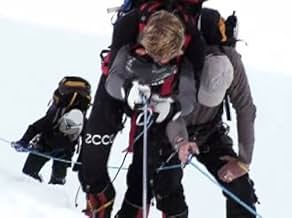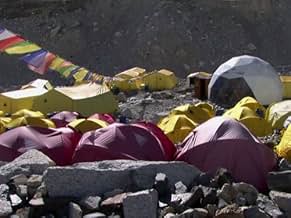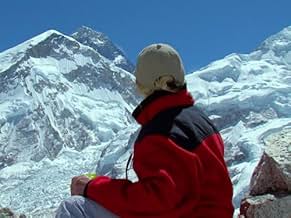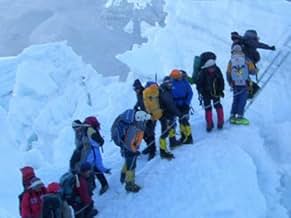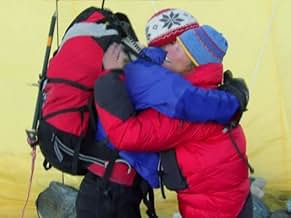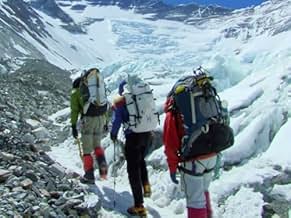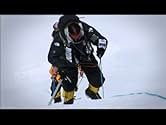Everest: Beyond the Limit
- टीवी सीरीज़
- 2006–2009
IMDb रेटिंग
8.3/10
1 हज़ार
आपकी रेटिंग
एक प्रोडक्शन दल, पर्वतारोहियों, उनके गाइडों और शेरपाओं की टीमों के माउंट एवरेस्ट के शिखर तक पहुंचने की वार्षिक प्रयास का अनुसरण करते हैं.एक प्रोडक्शन दल, पर्वतारोहियों, उनके गाइडों और शेरपाओं की टीमों के माउंट एवरेस्ट के शिखर तक पहुंचने की वार्षिक प्रयास का अनुसरण करते हैं.एक प्रोडक्शन दल, पर्वतारोहियों, उनके गाइडों और शेरपाओं की टीमों के माउंट एवरेस्ट के शिखर तक पहुंचने की वार्षिक प्रयास का अनुसरण करते हैं.
- पुरस्कार
- कुल 1 जीत
एपिसोड ब्राउज़ करें
फ़ीचर्ड समीक्षाएं
This show was amazing - highly recommended if you're interested in what it's like to climb Everest. Not for the faint of heart. It's all here - great storytelling, visuals, characters and events - and it's all real.
This 6 episode mini-series is brilliantly edited. Every episode keeps a brisk pace as you follow a team of climbers from base camp up the mountain. All of the episodes were engrossing as you follow the struggles and travails of the climbers ... all leading to the final 2 pulse-pounding episodes.
I really got a great appreciation of how major an undertaking climbing the mountain really is - even if you're in a commercial expedition like this (about $40K per person) and 'think' your life is going to be made a little easier. This show depicts what it's really like and it's tough - should be left to the best climbers.
The visuals are fantastic - you get a precise understanding of the camps locations, routes and topography by use of great 3-d graphics. Most spectacular is the use of cameras attached to various climbers' headgear ... you can see what's happening to the climbers all the time. Also fascinating was listening to the dialog (or lack thereof) with all the climbers via constant radio contact.
One more thing about the visuals - we've got a telescopic view from advanced base camp looking up at them so we can see where they are in relation to various parts of the mountain - how cool is that?
The climbers were also pretty interesting (though this series didn't really need it). They were all more or less amateurs. Among the climbers were a former Hell's Angels motorcycle designer, doctor, legless man (a double-amputee), and an asthmatic (climbing without oxygen supplement). They all come with different backgrounds and goals. It's kind of amazing to watch their mental and physical faculties drop as they get more and more oxygen deprived. This gives one a glimpse of how tough it is up there.
Without a doubt, this is one of the best reality shows I've seen - great intensity and learning involved - highly recommended.
This 6 episode mini-series is brilliantly edited. Every episode keeps a brisk pace as you follow a team of climbers from base camp up the mountain. All of the episodes were engrossing as you follow the struggles and travails of the climbers ... all leading to the final 2 pulse-pounding episodes.
I really got a great appreciation of how major an undertaking climbing the mountain really is - even if you're in a commercial expedition like this (about $40K per person) and 'think' your life is going to be made a little easier. This show depicts what it's really like and it's tough - should be left to the best climbers.
The visuals are fantastic - you get a precise understanding of the camps locations, routes and topography by use of great 3-d graphics. Most spectacular is the use of cameras attached to various climbers' headgear ... you can see what's happening to the climbers all the time. Also fascinating was listening to the dialog (or lack thereof) with all the climbers via constant radio contact.
One more thing about the visuals - we've got a telescopic view from advanced base camp looking up at them so we can see where they are in relation to various parts of the mountain - how cool is that?
The climbers were also pretty interesting (though this series didn't really need it). They were all more or less amateurs. Among the climbers were a former Hell's Angels motorcycle designer, doctor, legless man (a double-amputee), and an asthmatic (climbing without oxygen supplement). They all come with different backgrounds and goals. It's kind of amazing to watch their mental and physical faculties drop as they get more and more oxygen deprived. This gives one a glimpse of how tough it is up there.
Without a doubt, this is one of the best reality shows I've seen - great intensity and learning involved - highly recommended.
10wmarzan1
Having seen the first four televised episodes I am very impressed with this documentary and look forward to it each week.
To me it represents a human struggle against severe elements both physiologically and psychologically, intertwined with human emotion and interaction in a competitive environment.
It's also quite a thrill to be able to see such a high quality production....and I applaud Discover Channel for televising it. This is a real reality show; people do and will continue to die up there each year.
It's all about calculated risks. So far we have seen two client climbers abort their attempts because they were listening to their own bodies. That, in my mind, the first line of defense. They are the smart ones in that by saving themselves they avoid putting others at risk higher up on the slopes. Self rescue is the #1 rule of survival in many extreme sports for the same reason. Plan your climb and climb your plan. If you are off plan for reasons within yourself or reasons beyond your control, GO DOWN.
We are getting a unique view of one particular team and I would say what we are seeing (and about to see) is repeated by many other teams up there during climbing season each year.
wmarzan1
To me it represents a human struggle against severe elements both physiologically and psychologically, intertwined with human emotion and interaction in a competitive environment.
It's also quite a thrill to be able to see such a high quality production....and I applaud Discover Channel for televising it. This is a real reality show; people do and will continue to die up there each year.
It's all about calculated risks. So far we have seen two client climbers abort their attempts because they were listening to their own bodies. That, in my mind, the first line of defense. They are the smart ones in that by saving themselves they avoid putting others at risk higher up on the slopes. Self rescue is the #1 rule of survival in many extreme sports for the same reason. Plan your climb and climb your plan. If you are off plan for reasons within yourself or reasons beyond your control, GO DOWN.
We are getting a unique view of one particular team and I would say what we are seeing (and about to see) is repeated by many other teams up there during climbing season each year.
wmarzan1
As an Everest enthusiastic I've read a lot of books concerning the mountain. Lately I've been searching for good films and documentaries on the subject as well. When I checked IMDb for a series I found called 'Everest: Beyond the limit' I was thrilled. With an average grade of 8.6 and produced by the Discovery Channel this should be a blast. I was curious to see what it would be like.
The bottom-line of the show is simple. Every year, more and more commercial groups try to climb Everest. These groups consist of Westeners who have paid large sums of money to experienced Himalaya guides to get to the summit. 'Everest: Beyond the Limit' follows the commercial group lead by guide Russell Brice. The group consists of amateur climbers from all over the world, and his job is to get them to the summit. The series revolves around this struggle.
Interesting ingredients to make a stunning documentary, I'd say. Even more when considering this all happens on the steep faces of the highest mountain in the world. So, apart from the struggle to get to summit, I also expected to see impressive images, interesting background information on the mountain and an intriguing views in the lives of the Sherpa climbers who make the ascent possible.
But I can only say that after watching two seasons (I haven't seen the third yet) I am disappointed. Very disappointed. Instead of all the above, this show only focuses only on the Western climbers. The intelligence level of the show can be compared with MTV shows like 'Made' or 'My super sweet 16'. We are forced to watch the ups and downs of an asthmatic Dane and the mood swings of a Hell's Angel biker. We see a totally unprepared L.A.-journalist get pwned by the mountain. We watch them cry, suffer and struggle.
Off course, this has to be part of the show. It's the reality. But in my opinion it's a side-subject and the reason why I watch the show is Everest. I know that human interest can be very interesting, but in this show the center of attention is not the mountain or the way to the summit. The center of attention are the ups and downs of the climbers. The show revolves around it and for because of that it turned the pulp we already have too much of on TV. Really, it's 'The Real World goes Chomolungma'.
The first minutes of every episode are filled with flashbacks from the previous episode. I can understand that this is needed, to show the important things that happened before. But all the flashback focuses on is the human interest. After the flashback, we have to watch five minutes of previews of the coming episode. Off course, all focused on the human emotions. Every commercial break is preluded with a toe- wrenching cliffhanger. So dare not to swap your TV to another channel. In my personal opinion this is the exact opposite of the way the presentation should have been.
But, considering all this, I still rate the show a seven. Because when I look through all the mind-narrowing garbage the makers throw at me I see the most intriguing mountain of the world. I see a highly experienced guide trying to get through to novice stubborn clients. I see strong Sherpa's with interesting traditions (where the show obviously doesn't attends any attention to). But to see this, I have to fast forward through the all the melodrama and crap that fills up 25 minutes of every episode. But when I've done that, I see 20 minutes of high class TV.
The bottom-line of the show is simple. Every year, more and more commercial groups try to climb Everest. These groups consist of Westeners who have paid large sums of money to experienced Himalaya guides to get to the summit. 'Everest: Beyond the Limit' follows the commercial group lead by guide Russell Brice. The group consists of amateur climbers from all over the world, and his job is to get them to the summit. The series revolves around this struggle.
Interesting ingredients to make a stunning documentary, I'd say. Even more when considering this all happens on the steep faces of the highest mountain in the world. So, apart from the struggle to get to summit, I also expected to see impressive images, interesting background information on the mountain and an intriguing views in the lives of the Sherpa climbers who make the ascent possible.
But I can only say that after watching two seasons (I haven't seen the third yet) I am disappointed. Very disappointed. Instead of all the above, this show only focuses only on the Western climbers. The intelligence level of the show can be compared with MTV shows like 'Made' or 'My super sweet 16'. We are forced to watch the ups and downs of an asthmatic Dane and the mood swings of a Hell's Angel biker. We see a totally unprepared L.A.-journalist get pwned by the mountain. We watch them cry, suffer and struggle.
Off course, this has to be part of the show. It's the reality. But in my opinion it's a side-subject and the reason why I watch the show is Everest. I know that human interest can be very interesting, but in this show the center of attention is not the mountain or the way to the summit. The center of attention are the ups and downs of the climbers. The show revolves around it and for because of that it turned the pulp we already have too much of on TV. Really, it's 'The Real World goes Chomolungma'.
The first minutes of every episode are filled with flashbacks from the previous episode. I can understand that this is needed, to show the important things that happened before. But all the flashback focuses on is the human interest. After the flashback, we have to watch five minutes of previews of the coming episode. Off course, all focused on the human emotions. Every commercial break is preluded with a toe- wrenching cliffhanger. So dare not to swap your TV to another channel. In my personal opinion this is the exact opposite of the way the presentation should have been.
But, considering all this, I still rate the show a seven. Because when I look through all the mind-narrowing garbage the makers throw at me I see the most intriguing mountain of the world. I see a highly experienced guide trying to get through to novice stubborn clients. I see strong Sherpa's with interesting traditions (where the show obviously doesn't attends any attention to). But to see this, I have to fast forward through the all the melodrama and crap that fills up 25 minutes of every episode. But when I've done that, I see 20 minutes of high class TV.
As an armchair adventurer, I loved this series and the great camera and sound work that made it very real. The personalities are interesting and the dynamics between the expedition leader, the climbers and Sherpas provide plenty of drama for those of us who like to thrill-seek from the comfort of our living room. The only thing that might have made this series better was more of the in-depth interviews of the climbers and crew. I would have loved seeing the climbers returning home to their loved ones after their saga was over. Another thing I would have liked to have seen included is more of the behind- the-scenes footage of all the preparations that the leader, his crew, director and TV cameramen had to go through to get this documentary filmed .
I am fascinated by Mount Everest and mountaineering in general. Climbers are usually admirable, courageous people who adapt and persevere using experience and thorough preparation and training. They often have fascinating life stories. This show is not about them. The main characters in Everest: Beyond the Limit are newbies who pay tens of thousands of dollars to have their hands held up the mountain.
There are plenty of interesting characters around, but the guides, sherpas and veteran climbers are just supporting actors who we learn little about. We actually don't learn much about anything, since this show is all about drama not education. The third-grade-level narration relies on about fifteen Everest facts and cliches that are repeated every episode. My wife and I eventually started laughing when our favorites came back. We still have one season to watch, and are considering a Bingo game for recurring statements like:
Even if they make it to the summit there's no guarantee they'll make it back down. As they got higher, so did the risks. If they can't find him, he's as good as dead. And at this altitude that's a death sentence. Eighty per cent of the fatalities happen on the way down. In the death zone the body starts eating itself. The effort has left them exhausted. He knows he's lucky to be alive. But this day isn't over yet. He needs to get down fast And X treads the line between life and death. X is at a higher altitude than he's ever been. X is in unknown territory. After x his dream may be shattered.
For all the work and risk that went into producing this show, it seems like an opportunity wasted. Despite the problems, we are still watching, mostly for the scenery. The mountain, and the heroism of the sherpas and guides are dramatic enough to fill a show, and I wish they had.
There are plenty of interesting characters around, but the guides, sherpas and veteran climbers are just supporting actors who we learn little about. We actually don't learn much about anything, since this show is all about drama not education. The third-grade-level narration relies on about fifteen Everest facts and cliches that are repeated every episode. My wife and I eventually started laughing when our favorites came back. We still have one season to watch, and are considering a Bingo game for recurring statements like:
Even if they make it to the summit there's no guarantee they'll make it back down. As they got higher, so did the risks. If they can't find him, he's as good as dead. And at this altitude that's a death sentence. Eighty per cent of the fatalities happen on the way down. In the death zone the body starts eating itself. The effort has left them exhausted. He knows he's lucky to be alive. But this day isn't over yet. He needs to get down fast And X treads the line between life and death. X is at a higher altitude than he's ever been. X is in unknown territory. After x his dream may be shattered.
For all the work and risk that went into producing this show, it seems like an opportunity wasted. Despite the problems, we are still watching, mostly for the scenery. The mountain, and the heroism of the sherpas and guides are dramatic enough to fill a show, and I wish they had.
टॉप पसंद
रेटिंग देने के लिए साइन-इन करें और वैयक्तिकृत सुझावों के लिए वॉचलिस्ट करें
- How many seasons does Everest: Beyond the Limit have?Alexa द्वारा संचालित
विवरण
- रिलीज़ की तारीख़
- कंट्री ऑफ़ ओरिजिन
- आधिकारिक साइट
- भाषा
- इस रूप में भी जाना जाता है
- Эверест: За гранью возможного
- उत्पादन कंपनी
- IMDbPro पर और कंपनी क्रेडिट देखें
- रंग
इस पेज में योगदान दें
किसी बदलाव का सुझाव दें या अनुपलब्ध कॉन्टेंट जोड़ें


